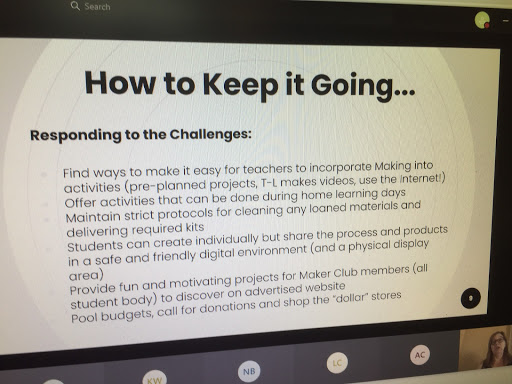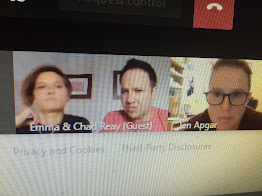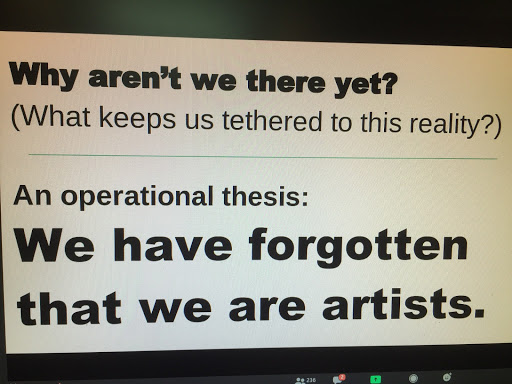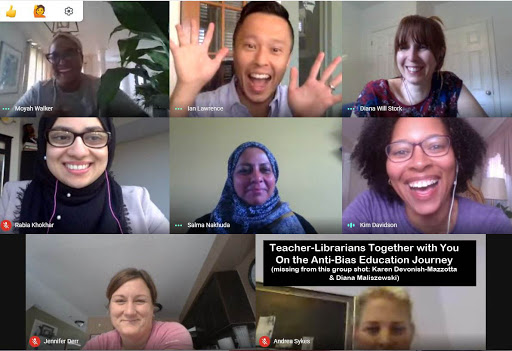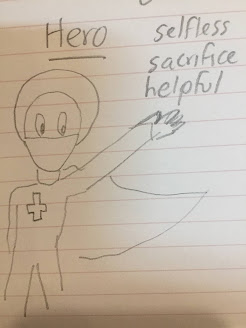I miss seeing my friends. The most convenient place that I'd get to see my educator friends would be at conferences. Now that conferences are all virtual, I must make do with seeing them on screens. That's better than nothing. Combined with some new learning, that's also not that bad.
This promotional image was created by TDSB teacher-librarian David Hoang. I tried to Photoshop something like it but his turned out waaaaaaay better. "Just try" seems to be the unofficial theme of the conference. The conference planners took some big risks that didn't always go off smoothly, but they were valiant in their efforts.
Tuesday, August 25, 2020
1:00 p.m.
Welcome and Directions by Mary Walker Hope, Michelle Fenn and Andrew Forgrave
Summary: Mary, Michelle and Andrew gathered us all in the "main room" for some explanations and instructions.
Microsoft Teams was the video conferencing tool the conference was employing to connect us. I had a brief training on how to use the basics a few days prior to help me as a presenter. Everything seemed to be in place.
Tuesday, August 25, 2020
1:30 pm
Taking The Making Online with Jen Taylor
Summary (from website):
Just when the momentum of our new Makerspace was building, Covid-19 arrived. How do we avoid losing that excitement and recapture the desire to Make, when it’s clear that come September, we will not be building robots or decorating cupcakes together? We go online, of course! Regardless of what school looks like in the fall, we'll need an online component to our Maker world. This session will explain how we are using Google Sites, WeVideo, Jamboard and other resources to encourage more Making and creating a digital companion to our school's physical Maker Culture.
The worst thing that could possibly happen in a virtual conference happened at this moment. None of the links to the "Team Rooms" worked. Presenters couldn't enter the virtual space. Participants couldn't join the workshops. Moderators (like my friend) were in the rooms by themselves with no one else present. It wasn't a complete disaster.
I was able to get into the session around 2:05 pm. Jen was an absolute trooper. She truncated her presentation and was able to provide some helpful tips to her audience.
3 Key Points:
1) Although it won't be the same, making opportunities can still exist. For example, metal is a decent type of material to clean, so her LLC's button maker might still be able to be used, with lots of cleaning and "rest" in between. Teachers can run the machines on behalf of the students, so fewer hands are touching the items.
2) Consider creating individualized making kits for students.
3) Use a Google Sites to keep the maker momentum going. Show the different ways of making, like canning. Jen will do a "Feature Teacher" where she profiles a different staff member each month and their making endeavors.
So What? Now What?
I looked at my 2019-20 scrapbook album and saw all the collaborative maker projects that happened and got a bit sad. I will need to be as creative as Jen Taylor in adapting maker tasks for my elementary aged students. Maybe I can use some of the tools that Kenisha Bynoe and Angelique Thompson gave us during the ETFO Summer Academy session they ran.
Related Images:
Tuesday, August 25, 2020
3:30 p.m.
Failing without Fear during Emergency Distance Learning - Lesson Learned; a Principal, Teacher and Parent Experience with Chad Reay, Emma Reay and Jen Apgar
There were 2:30 pm sessions but I tried very hard to space out my time on the computer so I wouldn't get screen fatigue.
Summary (from website):
Jen Apgar (21st Century Technology Coach from UGDSB - @JenApgar) will host a panel discussion with Author and Principal Chad Reay and veteran Technology Coach and Intermediate teacher Emma Reay. Using questions and ideas from Chad’s book “Failure Without Fear - An educator’s guide to supporting all students” Jen will invite Chad and Emma to share stories and answer questions about their biggest failures as educators (and parents) during the Emergency Distance Learning, how they survived and thrived and what lessons they are taking with them as they continue to fail forward through September 2020 start up and beyond
1) This kind of minsdet needs time to build, in a safe place. Do things like use the word failure and say when things are hard, because it's not lowering the bar, it's a chance to look at what we learned from the failures.
2) The emergency distance learning situation added extra pressure on educators because they didn't have their colleagues near them or with them to laugh off failures. Even tech-savvy educators faced obstacles.
3) As Brene Brown has said, being clear is kind; it is helpful to call someone out or in. Determine their level of readiness to hear feedback because often people will say "tell me anything" but not actually be in a state or place to accept constructive criticism. Try emojis for feedback or other tools.
Jen's analogy was spot-on and the frank talk (e.g. "banter does not translate well online") from Emma and Chad were refreshing. I got even more out of the after-chat, where Emma and Chad described the extent to which their children embrace the failure mentality and how birth order can make this challenging.
So What? Now What?
I was super-lucky that Jen Apgar chose to use trivia questions as a way to select the book winners. I actually won the book prize. My next step is very clear - I want to read Chad Reay's book, Failure without Fear: An Educator's Guide to Supporting All Students. I think I may (depending on what or who I'm teaching!) use as a thematic inquiry the concept of failure.
Related Images:
Wednesday, August 26, 2020
9:00 a.m.
Breaking the Silence: Acknowledging the Truth and Empowering Diverse Community Voices by Dr Jenny Kay Dupuis
Summary (from website):
 Jenny Kay shares her journey behind what inspired and motivated her to break the silence and create the bestselling children’s book, I Am Not a Number. Sharing her reflections on working with family, community, and the literary world, she tells stories with considerations for responsibilities, ethics, and protocols. She will share her knowledge of the power of teaching, telling, and hearing difficult stories, including ones that focus on the realities of diversity, human rights, and social justice issues through diverse literature such as I Am Not a Number, in classrooms, libraries, and community spaces.
Jenny Kay shares her journey behind what inspired and motivated her to break the silence and create the bestselling children’s book, I Am Not a Number. Sharing her reflections on working with family, community, and the literary world, she tells stories with considerations for responsibilities, ethics, and protocols. She will share her knowledge of the power of teaching, telling, and hearing difficult stories, including ones that focus on the realities of diversity, human rights, and social justice issues through diverse literature such as I Am Not a Number, in classrooms, libraries, and community spaces.
3 Key Points:
1) Stories are so important and need to be treated as such. She consulted with her family and with her community before she decided to share her grandmother's residential school experience story.
2) Jenny felt silenced in school. The stories told did not reflect her culture positively. (She mentioned a Halloween story and the bear wore a feather headdress as his costume.) Make sure there is representation, and positive representation.
3) Do not shy away from telling difficult stories.
So What? Now What?
One of my tweets from the session focused on how school libraries can perpetuate misinformation, like Dr Dupuis described the "Aboriginal Peoples of the Past" section in her childhood library. This is in contrast to author Jason Reynold's assertion that school librarians are the source of combating racist ideas. Both can be true. Teacher-librarians do have the ability (as Jess Longthorne said in her tweet) to make sure all voices are heard because censorship has serious consequences. The thing is, just being a TL doesn't magically turn you into an anti-racist crusader. You have to make changes and do the work. I plan on doing a diversity audit of my print collection, once I'm allowed to work in the space again safely.
Related Images:
Wednesday, August 26, 2020
11:00 a.m.
Virtual Playdates: Social Connections and Learning Through a Screen with Aviva Dunsiger and Paula Crockett
Summary (from website):
The Kindergarten Program Document supports play-based learning, so what happens when school moves online? We explored small group virtual playdates to help support social-emotional expectations, as well as linking literacy and math to learning done at home. Hear about a few of our experiences as well as talk about other virtual playdate possibilities for kindergarten and beyond. Learning starts with relationships. How might these virtual playdates help solidify them for educators, parents, and kids?
3 Key Points:
1) Pay attention to your learners. Paula and Aviva noticed that fewer students were coming to full group session and they missed socializing with each other, which is why they created group play dates with smaller numbers (maximum 6 children so everyone could see each other on the screen) and shorter time (30 minutes).
2) Use nature as much as possible, as well as your student leaders. They took virtual nature walk, near the areas the children were familiar with (which was lucky, because Paula and Aviva live close to the school region). Paula collected things which led to students bringing their own collections. The student leaders helped other students to communicate more effectively online by asking questions of each other as they played, like "How many did you use?"
3) Remember to prepare for synchronous and a-synchronous scenarios. Not every family could "attend" at the same time so they would video tape the walks for students to watch later.
So What? Now What?
I love how reflective Paula and Aviva are together. I also greatly admire their respectful collaboration. As I was listening to their talk, I had a huge AHA which I promised to share in this blog. Their experiences, with learning how to play and interact socially with young children, mirrored the situation my sister and I face with choosing activities to engage my mother in during our
virtual teas. Like Aviva and Paula, my sister and I are always thinking about things like materials, silence and time on a particular task (How much is enough? How much is too much?) I sent dice to my parents' house so we could play Tenzies, but they lost the materials. We can play Connect 4 because I can handle the materials and they can see it adequately and describe where they'd like me to place their game pieces. We monitor my mother's body language and comments during games like Spot It (which we have to modify because she forgets the names of items, so one card stays constant so she knows the words), to see if she has "had enough". We've discovered that she doesn't do well with more open-ended tasks unless someone is physically present and beside her (like with the Keva Planks). I'll need to watch how Aviva and Paula continue to support their young learners online because I can use these same strategies for my mom.


Related Images:
Wednesday, August 26, 2020
1:00 p.m.
Building Community and Belonging in a Distance Learning Environment by Maxime Thompson
Summary (from website):
A positive school culture bursts at the seams with student engagement and community. When schools in Ontario closed on March 14th, 2020 a huge piece of the community puzzle ceased to exist. In this presentation, I will talk about the four parts of an individual's self - physical, emotional, social, and spiritual - a teaching and concept I have learned from Dr Nicole Bell at Trent University. In a more traditional school setting teachers are adept at fostering and cultivating these four pieces, however, with digital learning and loss of physical closeness, it is more challenging to do. I will share a strategy that I have used to bring back the sense of belonging and community in a group of students through the creation of virtual clubs. I will talk about the power of Microsoft Teams, Global Competencies, and STEAM challenges as vehicles to give students purpose, belonging, and community connections that can be lost in the virtual world.
3 Key Points:
1) There are four parts to a human being: emotional, spiritual, social and physical. The goal of education should be to address/achieve a positive level in all of these areas.
2) Distance learning led to an unbalance and collective trauma for staff and students. Community cannot be created in curriculum but in joyful pursuits like clubs and teams.
3) Using tools such as MS Teams, FlipGrid, Mindomo, Minecraft and online class notebooks, virtual clubs can help bring back a sense of belonging and purpose. Max did this with Girls Who Game.
So What? Now What?
I need to create some clubs, so that students in different classes have a chance to socialize with each other. Maybe that Roblox Club the students have been asking me for could become a reality? I will need to see if tinyurl.com/yyaaplev will work - that's where Max posted her slide deck.
Wednesday, August 26, 20206:00 p.m.
Bells and Bug-Offs: The Benefits of ACNH and Why This Doesn't Equal In-Class Play by Diana Maliszewski
Summary (from website):
Animal Crossing New Horizons is a video game that has found unexpected popularity during the pandemic. There are many wellness benefits and natural connections to various aspects of the curriculum (media literacy, numeracy, social studies, etc.). It has also been an unexpected source of equity activism, and political/social discourse. This presentation/guided discussion highlights some of the thinking and learning possibilities to this game but also suggests an odd twist; think twice before turning it into your classroom focus. Your presenter has logged over 85 hours (and counting) of time on the game and, as a founding member of the GamingEdus, has some insights to share. (For a sneak peek, see http://mondaymollymusings.blogspot.com/2020/05/animal-crossing-new-horizons-popularity.html)
3 Key Points:
1) There are many benefits to playing video games like ACNH (sense of achievement, relaxing, set own pace, sense of control, opportunity to socialize, creativity, etc.).
2) Just because video games like ACNH have tons of curriculum connections (Language, Math, Science, Social Studies, etc.), this does not mean you must play them in class. Unlike Minecraft, ACNH is only for the Switch (a pricey console), plus there are issues around sharing, game culture vs school culture, the adult colonization and monetizing of play, and more.
3) You can still incorporate ACNH in without playing it in class. Suggestions include using your shared enjoyment of the game as a building block for building relationships with students, reading materials, options in reading, writing, and mathematical tasks, displays, etc.
So What? Now What?
A comment by my hard-working moderator (thank you again, Jason Lay!!) made me realize that even though I felt like the "gamification vs games based learning" conversation is an old one that doesn't need to be repeated, it's actually a distinction that still confuses people. Thankfully, I had the handy-dandy analogy by Jen Apgar to use to explain difference. I had so much fun speaking with Denise Colby on the phone as my GBL consultant. The next step is that we are going to reinvigorate the GamingEdus website. Andy Forgrave (ECOO president) is now hosting the site and my promise to myself is to add more content. We may even get the old members of GamingEdus play D&D together in the future! (I also want to thank Amanda and Sarah for trouble-shooting my Teams issues. I need to figure out a way to see the chat while presenting in Teams, and I have to do this before October 23!)
Thursday, August 27, 2020
10:00 a.m.
Connecting to Learning: The Virtual School Library Learning Commons with Jenn Brown and Beth Lyons
Summary (from website):
School library professionals across Ontario utilized existing virtual library learning commons to connect with staff, students and families during distance learning. Join OSLA council members to discuss this important collaborative tool for distance learning and beyond. Topics include: creating, updating and maintaining the virtual library learning commons, using webinars, virtual content curation and discussions to better understand school wide value of a virtual library learning commons.
3 Key Points:
1) The slide deck link can be found at bit.ly/ECOOvllcR1 and bit.ly/ECOOvllcOPEN - try creative ways of approaching usual practices, like virtual genius carts, or live readings with inquiry questions posted afterwards.
2) Try to personalize interactions. For example, make a video on how to find things in the VLLC, or use other tools like Apple Clips, Adobe Spark or Screencastify to reply to a query instead of an email.
3) Equity is not a side gig- it should be part of everything you do in the VLLC and SLLC.
There were so many sessions at the same time that I wanted to see (like Centralizing Student Wellness in the Virtual Classroom and Beyond by Timea Szoboszlai and The Global Learner: Creating Cross-Curricular Units that foster STEM and 21st Century competencies by Manprit Rai and Chelly Persad) but this one was focused directly on school libraries, so how could I pass it up?
So What? Now What?
I need to continue to reach out to the larger Ontario school library community for support and inspiration.
Related Images:
Thursday, August 27, 2020
11:00 a.m.
Anti-Racism Through Media Literacy: Online and On-Ground Classroom Approaches by Michelle Solomon and Carol Arcus
Summary (from website):
Media literacy can identify constructed social and cultural biases, but how might it also mitigate against racism? This interactive session will discover and examine the roles of social and mainstream media in racist attitudes and activity, and also as positive forces for awareness and change. Rich teaching strategies include on-ground and on-line learning approaches, and the application of key media literacy concepts as a grounding framework.
3 Key Points:
1) Great tip for online presenting > use icons so viewers can be prepared for what will be asked of them (e.g. "respond in chat" or "take notes").
2) Understand these four terms: Hegemony, Anti-racist, Decolonization, and Media Literacy.
3) Media have so many layers (e.g. the Vanity Fair cover of Breonna Tayler - painting vs magazine cover vs other representations / Breonna as more than just her death / Breonna's image for consumerism, used to sell magazines / values promoted).
So What? Now What?
I'm lucky that I know and am involved with AML. I'll continue to learn from their amazing members and ensure that my media lessons are opportunities to address inequities.
Appointments (as a moderator for a TDSB webinar and to get my hair cut) presented me from seeing several anticipated sessions. I'm making a list here so that I make sure I return to the recordings to hear their wise words.
- More Than a Selfie: Exploring Identity Through Photography by Tina Zita
- BOBs: Sure Things in Unsure Times by Noa Daniel
- Creating a Digital Toolkit to Support and Engage Literacy Learners by David Hoang and Casely Macdonald
- Taking An Extra-Curricular Online: My experience to help students stay connected during emergency remote learning by Nadine Osborne
- Teaching Students to be Critical Evaluators of Online Content by Ash Dwight
I only made it back in time for the last ten minutes or so of the closing keynote, which is why I'll refrain from giving it the usual "Summary / 3 Key Points / So What Now What" treatment.
Again, thank you so much to Mary, Michelle, Andy, all the committee members, all the presenters, all the moderators, all the vendors and all the attendees for making this risk a risk worth taking.
 Jenny Kay shares her journey behind what inspired and motivated her to break the silence and create the bestselling children’s book, I Am Not a Number. Sharing her reflections on working with family, community, and the literary world, she tells stories with considerations for responsibilities, ethics, and protocols. She will share her knowledge of the power of teaching, telling, and hearing difficult stories, including ones that focus on the realities of diversity, human rights, and social justice issues through diverse literature such as I Am Not a Number, in classrooms, libraries, and community spaces.
Jenny Kay shares her journey behind what inspired and motivated her to break the silence and create the bestselling children’s book, I Am Not a Number. Sharing her reflections on working with family, community, and the literary world, she tells stories with considerations for responsibilities, ethics, and protocols. She will share her knowledge of the power of teaching, telling, and hearing difficult stories, including ones that focus on the realities of diversity, human rights, and social justice issues through diverse literature such as I Am Not a Number, in classrooms, libraries, and community spaces.



